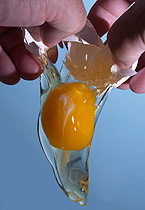Social Issues briefing #054, 27/10/2006.

As we head into the final days before the proposed cloning bill is due to be voted on in Parliament, events are being held around the nation to help people gain a better understanding of the complex issues involved and the implications of various aspects of the proposed bill. One such forum was organised in Canberra last week with around 150 women gathering at Parliament House to take part in the Australian arm of the Hands Off Our Ovaries (HOOO) campaign. HOOO is an international coalition of women who are seeking a moratorium on egg extraction for research purposes " with cloning being called a new human rights issue. The forum was organised for women, as women are particularly vulnerable in the embryonic stem cell debate.
Speakers included Katrina George (Women's Forum Australia), Senator Ursula Stevens, Senator Concetta Fierravanti-Wells, Dr Monique Baldwin (scientist), The Hon Jackie Kelly MP, The Hon Christine Campbell MLA, Dr Renate Klein (FINRAGE)
What does cloning have to do with women and their ovaries?
Cloning requires women's eggs. Vast quantities of them. And if the legislation currently before the Parliament is passed, research industries will be knocking on the doors of Australian women in order to get those eggs.
Cloning can require 100 eggs per clone. How are the eggs in that quantity obtained? Through powerful hormones administered to women. These drugs hyper-stimulate the ovaries to produce multiple eggs, rather than the usual one egg per monthly cycle. Egg extraction requires powerful drugs which have short and long term health risks for women, including ovarian hyper stimulation syndrome, organ failure, stroke, infertility and death. Long term risks are poorly understood but already research points to reproductive cancers in later life. The end does not justify these means.
One speaker commented that many women will go through the discomfort/risks of ovarian hyperstimulation if they are longing for a child " life. But should they be asked to go through this for death? To produce eggs to help form a cloned embryo which is destined to be wilfully destroyed?
Another question which was raised at the forum was this: How meaningful is "informed consent' when we don't know the long term health risks for women? There is much that is unknown about the long-term effects of ovarian hyperstimulation. How can women be protected from risks that we don't even understand?
There was also concern that research cloning will eventually result in a commercial trade in ova. This is prohibited by both Bills but international experience (including UK) shows that paying women for ova is the only way to obtain near sufficient supplies. The commercial trade in ova would induce women " particularly the disadvantaged " to assume the serious health risks of ova extraction for money.
In addition, aside from the health risks to women, not all scientists support human cloning.
Australians deserve a biotechnology that benefits all citizens.
We encourage you all to write to your senators to express your opposition to the proposed legislation. For the reasons stated above, as well as many other reasons (see [url=http://sydneyanglicans.net/indepth/clone_wars_2/]http://sydneyanglicans.net/indepth/clone_wars_2/[/url]) cloning does not reflect the fact that all humans are precious as we are created in the image of God " from the smallest embryo to a fully grown person. To value some lives above others is to deny this truth.
You can obtain contact details for the Senators in your state or territory by going to [url=http://www.aph.gov.au/Senate/senators/index.htm]http://www.aph.gov.au/Senate/senators/index.htm[/url].
Tracy Nodder
for the Social Issues Executive, Diocese of Sydney
Conditions of use:
1. You may forward this paper to others, as long as you forward it in full.
2. You may freely publish it (e.g. in a church newspaper) as long as it is published in full, not for profit, and including this acknowledgement: "A briefing paper by Tracy Nodder of the Social Issues Executive, Anglican Diocese of Sydney. To access this free weekly briefing, send your email address to social.issues@moore.edu.au or visit [url=http://www.sydneyanglicans.net/socialissues]http://www.sydneyanglicans.net/socialissues[/url] ."
3. Media and academic publishers should cite this paper according to their professional standards. We would appreciate audiences being directed to [url=http://www.sydneyanglicans.net/socialissues]http://www.sydneyanglicans.net/socialissues[/url] .
4. Other not-for-profit publishers may use the ideas in this paper without acknowledgement, but if quoting it directly should quote the title of the paper and include an acknowledgement similar to the one in point 2.
5. Permission may be given for use in publications for profit. Please send details of your proposal to tracy.nodder@moore.edu.au.






















